Please fill out the following information, and RRFC Admissions will contact you to discuss our program offerings:
Issue #156
by L. Swift and Jeff McQ
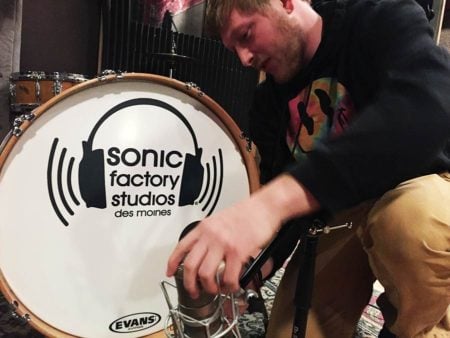 When you’re learning on the job in a real recording studio, you never know when it will happen: the chance to work with a major band or artist. For Recording Connection student Brandyn Zellmer, who apprentices in Des Moines, Iowa, it came in the middle of a family event.
“I was at my cousin’s wedding,” he explains. “Jon, my current mentor, texted me and asked me if I would like to potentially set up for a famous band. I was like, ‘Yeah, sure, why not?’”
It turned out the band was Lady Antebellum, who were in town on a tour stop at the Iowa State Fair. The call was to do last-minute vocals for the soundtrack of an upcoming remake of Dirty Dancing.
“They flew out a producer, his name’s Alex,” says Brandyn. “And so I set up the mics and ran the patch bay and stuff and got to meet everybody…They did a three-part harmony for it, and so that was really neat to watch them in action and seeing one by one and how everything kind of fell together.”
A lifetime musician, Brandyn says his interest in recording began as a teenager when his rock band went into the studio to record a demo. “I just thought it was awesome how everything was captured,” he says, “and just the whole fundamentals of the recording process.”
However, after starting on a music major at a local community college, Brandyn soon realized he needed more than he was getting as far as technical knowledge was concerned. “After the first year, I kind of realized that it was going to be about two years of general education, and that’s not exactly what I was looking for,” he says. “I was looking for more of a live production kind of thing or even studio production. So then I started looking into…recording schools and my mom was actually the one who stumbled across the Recording Connection.”
When you’re learning on the job in a real recording studio, you never know when it will happen: the chance to work with a major band or artist. For Recording Connection student Brandyn Zellmer, who apprentices in Des Moines, Iowa, it came in the middle of a family event.
“I was at my cousin’s wedding,” he explains. “Jon, my current mentor, texted me and asked me if I would like to potentially set up for a famous band. I was like, ‘Yeah, sure, why not?’”
It turned out the band was Lady Antebellum, who were in town on a tour stop at the Iowa State Fair. The call was to do last-minute vocals for the soundtrack of an upcoming remake of Dirty Dancing.
“They flew out a producer, his name’s Alex,” says Brandyn. “And so I set up the mics and ran the patch bay and stuff and got to meet everybody…They did a three-part harmony for it, and so that was really neat to watch them in action and seeing one by one and how everything kind of fell together.”
A lifetime musician, Brandyn says his interest in recording began as a teenager when his rock band went into the studio to record a demo. “I just thought it was awesome how everything was captured,” he says, “and just the whole fundamentals of the recording process.”
However, after starting on a music major at a local community college, Brandyn soon realized he needed more than he was getting as far as technical knowledge was concerned. “After the first year, I kind of realized that it was going to be about two years of general education, and that’s not exactly what I was looking for,” he says. “I was looking for more of a live production kind of thing or even studio production. So then I started looking into…recording schools and my mom was actually the one who stumbled across the Recording Connection.”
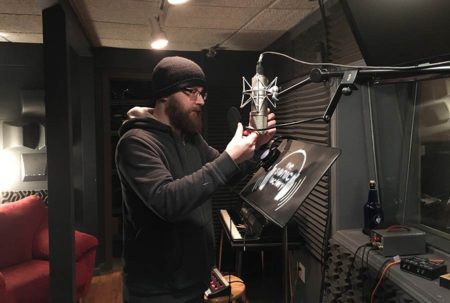
Recording mentor Jon Locker
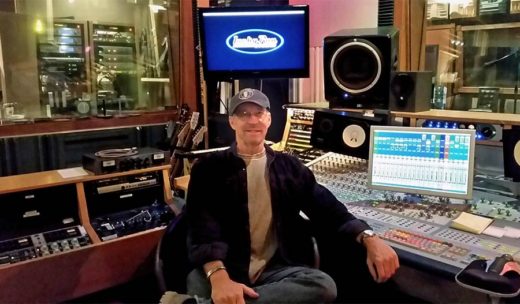 RRFC: Can you tell us a bit about how you got into recording as a career?
Michael Mikulka: Like a lot of guys, I started off playing an instrument and playing in bands. That goes back to playing guitar starting back in like junior high school. And I was fortunate enough to be in some, to be able to perform a lot. I did a lot of touring back in my early 20s and such. I did a certain amount of session work. I grew up in Southern California, so I was definitely familiar with the Southern California music scene, and I started, as I was doing sessions as a guitar player, then I’d come into the control room and look at the control room and all the stuff that was going on there. And I just went, “Wow, this seems like the coolest job ever.”…I had a friend who had a studio, and I used to go hang out with him, and he basically, you know, I kind of learned on the job, and he kind of showed me enough stuff. And I had a little bit of an aptitude for it and, you know, from learning PA systems and stuff for bands and went from there…I was just so fascinated with the process. And so I just kind of got into it as kind of a side thing. I should say that I’m one of those fortunate, fortunate people. I’ve never had a real job. I’ve always made a living as a musician either as a guitarist or as a recording engineer.
RRFC: Can you talk about the principles underlying the technology? Have those changed since you started in the industry, or have those stayed the same?
Michael: When I started out, everything was on tape, so I’m one of the few people still around in this area who know how to cut your two inch tape and edit it together, which is a wonderfully useless skill these days. But the capture medium has changed tremendously going from tape to the digital workstations, to doing it that way. But the front end has not. In other words, a classic vocal mic in front of a singer and, with a great singer and run through a great preamp, that hasn’t changed at all. I mean, newer microphones and newer preamps, but still, you know, I’ve got a couple microphones that are vintage microphones, and there’s ones I’ve used a long time ago, and I’m still using them…Now there’s a lot of mystique and there’s a lot of romance that’s connected with recording on tape, and I still get people asking about that. And let me say it this way: people say, “Well, tape sounds better.” I say, “No, tape sounds different. It just sounds different.” It’s Fords and Chevys. It’s which one you like better.
RRFC: Among the artists you’ve worked with, are there any projects you particularly love?
Michael: Well the most recent we did that got some notoriety, the artist’s name is Solange. She’s Beyoncé’s sister. And when her record came out a month or so ago, it was the number one download on iTunes for quite some time. In this day and age that means everything, you know? She loved the studio. She can work wherever she wants. And she came in and virtually cut all her vocals here. She just liked the room. She liked the sound, liked the vibe of the whole thing, and was, you know, really a sweetheart to work with.
RRFC: Is there anything in particular that you feel like everyone working in the studio should know about their job?
Michael: At one point when I was teaching, I went and I did information interviews with the studio managers of seven or eight of the largest studios in Los Angeles…I talked to them, and I said, “What are you looking for when you’re hiring somebody? What kind of things are important?” Nine out of ten said, “Give me somebody with people skills. I can teach them the other stuff. Because I’m now going to put this person in a room for the next eight or nine hours with my client. If they don’t know how to get along, when to talk, when not to talk, the protocol, the format for that, they’re out.” I mean, you’ve got to learn the technical stuff. There’s no question about it. But if you’re talking about getting into like a commercial recording studio…so much involves making them comfortable, making them relax, treating them professionally. Nothing makes more of a difference for the quality of the vocal than the singer being relaxed and comfortable. I don’t care what mic, what preamp, whatever you do, the thing that will make the biggest difference I’ve found, and this is having done this a few thousand times, is getting a singer to feel comfortable and relaxed.
RRFC: Can you tell us a bit about how you got into recording as a career?
Michael Mikulka: Like a lot of guys, I started off playing an instrument and playing in bands. That goes back to playing guitar starting back in like junior high school. And I was fortunate enough to be in some, to be able to perform a lot. I did a lot of touring back in my early 20s and such. I did a certain amount of session work. I grew up in Southern California, so I was definitely familiar with the Southern California music scene, and I started, as I was doing sessions as a guitar player, then I’d come into the control room and look at the control room and all the stuff that was going on there. And I just went, “Wow, this seems like the coolest job ever.”…I had a friend who had a studio, and I used to go hang out with him, and he basically, you know, I kind of learned on the job, and he kind of showed me enough stuff. And I had a little bit of an aptitude for it and, you know, from learning PA systems and stuff for bands and went from there…I was just so fascinated with the process. And so I just kind of got into it as kind of a side thing. I should say that I’m one of those fortunate, fortunate people. I’ve never had a real job. I’ve always made a living as a musician either as a guitarist or as a recording engineer.
RRFC: Can you talk about the principles underlying the technology? Have those changed since you started in the industry, or have those stayed the same?
Michael: When I started out, everything was on tape, so I’m one of the few people still around in this area who know how to cut your two inch tape and edit it together, which is a wonderfully useless skill these days. But the capture medium has changed tremendously going from tape to the digital workstations, to doing it that way. But the front end has not. In other words, a classic vocal mic in front of a singer and, with a great singer and run through a great preamp, that hasn’t changed at all. I mean, newer microphones and newer preamps, but still, you know, I’ve got a couple microphones that are vintage microphones, and there’s ones I’ve used a long time ago, and I’m still using them…Now there’s a lot of mystique and there’s a lot of romance that’s connected with recording on tape, and I still get people asking about that. And let me say it this way: people say, “Well, tape sounds better.” I say, “No, tape sounds different. It just sounds different.” It’s Fords and Chevys. It’s which one you like better.
RRFC: Among the artists you’ve worked with, are there any projects you particularly love?
Michael: Well the most recent we did that got some notoriety, the artist’s name is Solange. She’s Beyoncé’s sister. And when her record came out a month or so ago, it was the number one download on iTunes for quite some time. In this day and age that means everything, you know? She loved the studio. She can work wherever she wants. And she came in and virtually cut all her vocals here. She just liked the room. She liked the sound, liked the vibe of the whole thing, and was, you know, really a sweetheart to work with.
RRFC: Is there anything in particular that you feel like everyone working in the studio should know about their job?
Michael: At one point when I was teaching, I went and I did information interviews with the studio managers of seven or eight of the largest studios in Los Angeles…I talked to them, and I said, “What are you looking for when you’re hiring somebody? What kind of things are important?” Nine out of ten said, “Give me somebody with people skills. I can teach them the other stuff. Because I’m now going to put this person in a room for the next eight or nine hours with my client. If they don’t know how to get along, when to talk, when not to talk, the protocol, the format for that, they’re out.” I mean, you’ve got to learn the technical stuff. There’s no question about it. But if you’re talking about getting into like a commercial recording studio…so much involves making them comfortable, making them relax, treating them professionally. Nothing makes more of a difference for the quality of the vocal than the singer being relaxed and comfortable. I don’t care what mic, what preamp, whatever you do, the thing that will make the biggest difference I’ve found, and this is having done this a few thousand times, is getting a singer to feel comfortable and relaxed.
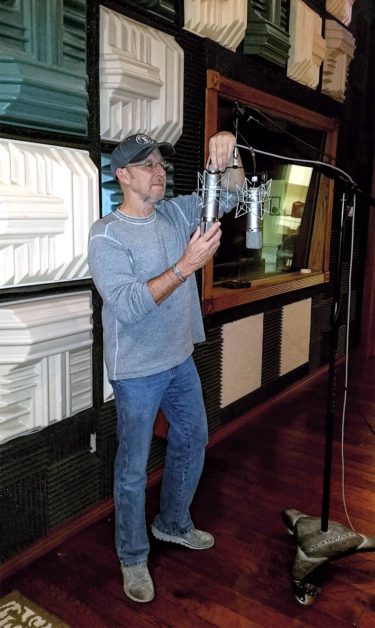 RRFC: So what do you look for in apprentices? Let’s say I want to come in and apprentice with you; what qualities do you want me to have?
Michael: It’s not so important that you know a lot of stuff. It’s more important that you’re really observant and you’re watching what’s going on. Because I think what we offer, and this is what’s so cool about your program, is they get a lot of great background, and what we’re doing from the studio side is trying to show it in real-time because having taught at a couple schools now, I can tell you that’s the biggest weakness of the recording schools. You don’t get enough hands-on, and you don’t get real-time situations for the most part.
And then, know enough to jot down what questions you have and wait until we have a break, and then let’s talk about them, you know? Don’t interrupt the session because these people are paying money…The other thing I suggest, you know, [is] go see other people, how they’re doing it, because there’s so many different ways to do this stuff. And I’m just going to show you what I’ve, over the years, things that I’ve found that be helpful. The other thing, this is a personal thing with me…put your cellphone in your pocket unless you’re using it to take notes.
RRFC: Do you give some of your better apprentices the opportunity to help out and assist on real sessions?
Michael: Absolutely…With certain clients, I might start the session, and I’ll set one of my students in there, particularly, I’ve got two that are a little more advanced. And I’ll set them down there, and they end up a lot of times doing the session, and I’m just kind of there. I mean, I don’t throw them in the deep end, I don’t give them something they couldn’t do, but what I typically do is I’m doing the session, and of course, the assistant—I’m going to call them assistant engineers there—and so that the client sees them there and I’m saying, “Could you get this, and do that?” And then as they’re working on something, I say, “Hey guys, I need to go use the restroom. Jack, will you play this back for them?” So he sits down in the seat, now he’s running the playback. So now they say, “Oh, he’s part of the team.”…Now they start the song, and I just kind of drift out of the picture. Next thing you know, he’s doing the session. And when they’re finished with that, and they walk away from that, they go, “Man, I just cut a whole band!”
RRFC: Is there anyone among your apprentices who is standing out to you right now?
Michael: Dale [Salberg] is 15, 18 years older than the rest of them. He’s already got, I mean he’s like a grownup with a regular job. He wants to get out of what he’s doing and get into music. If he’s got a spare moment, he’s down here…I can tell you right now, he could come in and do a session by himself. He’s been here that much. He’ll come in and I’ll be finishing stuff and he’ll ask, “Can I stay?” and [I say], “Yeah, I’m going to go to the phone. I’m going to answer emails and stuff like that. If you want to stay, clean up the stuff, and then play around with the mixes, whatever. As long as we’ve got stuff backed up somewhere else, it all just makes him more valuable to me.
RRFC: Anything else you’d like to convey to our students?
Michael: Well, I think that people ought to decide whether they want to be an independent engineer, whether they want to be an engineer/producer, whether they want to run a studio. You know, there’s three different areas of expertise all based on that same discipline of…studying engineering but you’ve got to decide. If you’re an independent engineer, and you’re going to work at several studios, then you have to really be good at signal flow because you’re going to be going into different rooms and it’s going to look different. It’s going to have different equipment and stuff like that, and you have to be able to adapt to that. If you’re looking to be like more of an engineer/producer…it’s all pretty much sequence, you’ve got to have sequencing and programming skills, and composing skills, you know? If you want to jump in with both feet like I do and actually run a studio, then you also have to know that you’re running a business besides the fact that you get to record.
RRFC: So what do you look for in apprentices? Let’s say I want to come in and apprentice with you; what qualities do you want me to have?
Michael: It’s not so important that you know a lot of stuff. It’s more important that you’re really observant and you’re watching what’s going on. Because I think what we offer, and this is what’s so cool about your program, is they get a lot of great background, and what we’re doing from the studio side is trying to show it in real-time because having taught at a couple schools now, I can tell you that’s the biggest weakness of the recording schools. You don’t get enough hands-on, and you don’t get real-time situations for the most part.
And then, know enough to jot down what questions you have and wait until we have a break, and then let’s talk about them, you know? Don’t interrupt the session because these people are paying money…The other thing I suggest, you know, [is] go see other people, how they’re doing it, because there’s so many different ways to do this stuff. And I’m just going to show you what I’ve, over the years, things that I’ve found that be helpful. The other thing, this is a personal thing with me…put your cellphone in your pocket unless you’re using it to take notes.
RRFC: Do you give some of your better apprentices the opportunity to help out and assist on real sessions?
Michael: Absolutely…With certain clients, I might start the session, and I’ll set one of my students in there, particularly, I’ve got two that are a little more advanced. And I’ll set them down there, and they end up a lot of times doing the session, and I’m just kind of there. I mean, I don’t throw them in the deep end, I don’t give them something they couldn’t do, but what I typically do is I’m doing the session, and of course, the assistant—I’m going to call them assistant engineers there—and so that the client sees them there and I’m saying, “Could you get this, and do that?” And then as they’re working on something, I say, “Hey guys, I need to go use the restroom. Jack, will you play this back for them?” So he sits down in the seat, now he’s running the playback. So now they say, “Oh, he’s part of the team.”…Now they start the song, and I just kind of drift out of the picture. Next thing you know, he’s doing the session. And when they’re finished with that, and they walk away from that, they go, “Man, I just cut a whole band!”
RRFC: Is there anyone among your apprentices who is standing out to you right now?
Michael: Dale [Salberg] is 15, 18 years older than the rest of them. He’s already got, I mean he’s like a grownup with a regular job. He wants to get out of what he’s doing and get into music. If he’s got a spare moment, he’s down here…I can tell you right now, he could come in and do a session by himself. He’s been here that much. He’ll come in and I’ll be finishing stuff and he’ll ask, “Can I stay?” and [I say], “Yeah, I’m going to go to the phone. I’m going to answer emails and stuff like that. If you want to stay, clean up the stuff, and then play around with the mixes, whatever. As long as we’ve got stuff backed up somewhere else, it all just makes him more valuable to me.
RRFC: Anything else you’d like to convey to our students?
Michael: Well, I think that people ought to decide whether they want to be an independent engineer, whether they want to be an engineer/producer, whether they want to run a studio. You know, there’s three different areas of expertise all based on that same discipline of…studying engineering but you’ve got to decide. If you’re an independent engineer, and you’re going to work at several studios, then you have to really be good at signal flow because you’re going to be going into different rooms and it’s going to look different. It’s going to have different equipment and stuff like that, and you have to be able to adapt to that. If you’re looking to be like more of an engineer/producer…it’s all pretty much sequence, you’ve got to have sequencing and programming skills, and composing skills, you know? If you want to jump in with both feet like I do and actually run a studio, then you also have to know that you’re running a business besides the fact that you get to record.
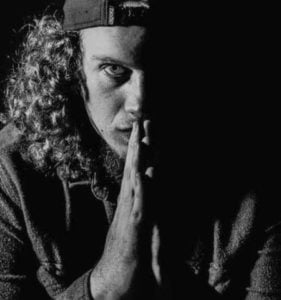 Congrats to Recording Connection grad Christopher Locke (Austin, TX) who recently won Engineer of the Year at the Austin Hip Hop Awards! Now a prominent player in the Austin hip-hop scene, Chris’s unique spin on hip-hop vocal production has resulted in a nearly never-ending stream of clients. He says, “I work with pretty much 85% of the hip-hop community in Austin now…I work like 60 to 70 hours a week. Pretty much every day is like a ten-hour day for me, and I strictly work with hip-hop and rap and R&B. I stay completely booked with that and I don’t have to ever worry about trying to find business anymore, because it just comes to me.” And good things come to those who grind! Keep on grinding Chris!
Congrats to Recording Connection grad Christopher Locke (Austin, TX) who recently won Engineer of the Year at the Austin Hip Hop Awards! Now a prominent player in the Austin hip-hop scene, Chris’s unique spin on hip-hop vocal production has resulted in a nearly never-ending stream of clients. He says, “I work with pretty much 85% of the hip-hop community in Austin now…I work like 60 to 70 hours a week. Pretty much every day is like a ten-hour day for me, and I strictly work with hip-hop and rap and R&B. I stay completely booked with that and I don’t have to ever worry about trying to find business anymore, because it just comes to me.” And good things come to those who grind! Keep on grinding Chris!
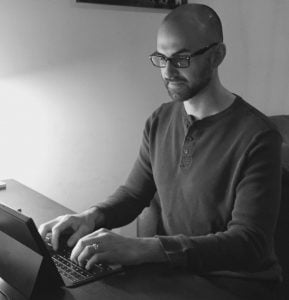 Kudos to Film Connection grad and screenwriter Geoffrey D. Calhoun (Detroit, MI), who was just announced as a top 100 indie screenwriter of 2017 and nominated for “Best Unproduced Screenplay” at the London Film Fest International. Guess who’s going to London next month!
Kudos to Film Connection grad and screenwriter Geoffrey D. Calhoun (Detroit, MI), who was just announced as a top 100 indie screenwriter of 2017 and nominated for “Best Unproduced Screenplay” at the London Film Fest International. Guess who’s going to London next month!

RRFC is education upgraded for the 21st century.
Get the latest career advice, insider production tips, and more!
Please fill out the following information, and RRFC Admissions will contact you to discuss our program offerings:
Stay in the Loop: Subscribe for RRFC news & updates!
© 2025 Recording Radio Film Connection & CASA Schools. All Rights Reserved.


